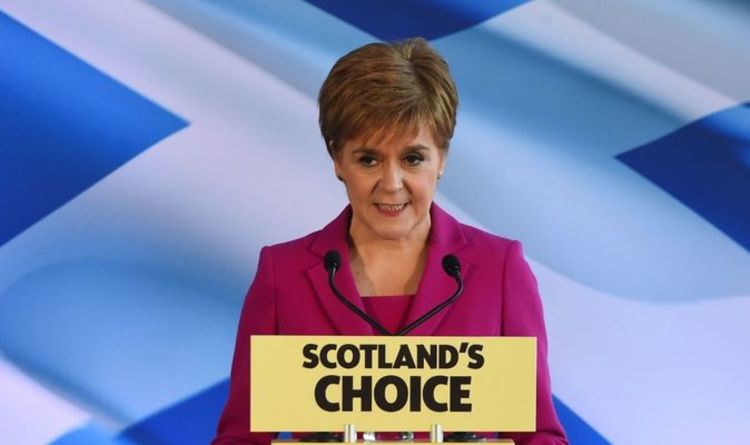Scottish independence ‘is a myth’ says Patrick Christys
We use your sign-up to provide content in ways you’ve consented to and to improve our understanding of you. This may include adverts from us and 3rd parties based on our understanding. You can unsubscribe at any time. More info
Breaking up the 300-year-old union between England and Scotland could severely damage Scotland’s economy, a leading economist appointed to Sturgeon’s panel of advisers has warned. One of Ms Sturgeon’s own advisors has admitted the economic fallout from blowing apart the union could be the “biggest Brexit in history.”
Professor Mark Blyth is a member of Ms Sturgeon’s council of economic advisers – he has warned of the dire economic consequences of independence.
In an interview with the Foreign Press Association, Professor Blyth said untangling centuries of economic integration between England and Scotland would “hurt a lot”.
He said: “It [the Union] has been together for over 300 years.
“So, if pulling apart 30 years of economic integration with Europe is going to hurt, 300 years is going to hurt a lot.”


Professor Blyth suggested a major argument behind Scotland’s desire for independence, Brexit, doesn’t make sense.
He said: “If your argument is that we need to do this because of Brexit, then Scotland separated from England is the biggest Brexit in history.
“The last time Scotland was fully economically independent, the word capitalism hadn’t been uttered.”
Do Scots want independence?
The appetite for Scottish independence has fallen according to the latest polls.

An independence referendum voting intention poll by Redfield & Wilton Strategies finds ‘No’ is leading by three percent.
Currently, more Scots appear in favour of staying in the union rather than leaving it.
Altogether, 47 percent of respondents say they would vote ‘no,’ while 44 percent say they would vote ‘yes’ in an independence referendum.
Whilst nine percent said they didn’t know how they would vote.

The poll found a clear correlation between age and voting intention.
As expected, younger voters were more inclined to vote yes to independence, than their older counterparts.
A whopping 62 percent of respondents aged 16 to 24 and 25 to 34 said they would vote ‘yes’.
Whilst only 29 percent of respondents aged 65 and above would vote the same way.

Despite Ms Sturgeon’s eagerness to hold a referendum, most Scots think now is the wrong time to hold an independence vote.
According to the poll, 47 percent of Scots would oppose a referendum being called next year, with 33 percent opposing it strongly.
Just 40 percent said they would support a referendum being held next year.
Alex Apati of Ladbrokes said: “Nicola Sturgeon may well get her wish for another referendum as early as next year, but the odds suggest it’s unlikely to be the result she wants.”
Ladbrokes has said the odds of Scotland to vote YES to independence before 2023 are just 16/1.
It seems savvy Scots echo Boris Johnson’s ideas “this is not the time” for a referendum.
Boris Johnson said: “I think that most people in Scotland, most people around the whole of the UK, feel that this is not the time, as we’re coming forward out of a pandemic together, this is not the time to have a reckless, and I think irresponsible second referendum.”
Source: Read Full Article
